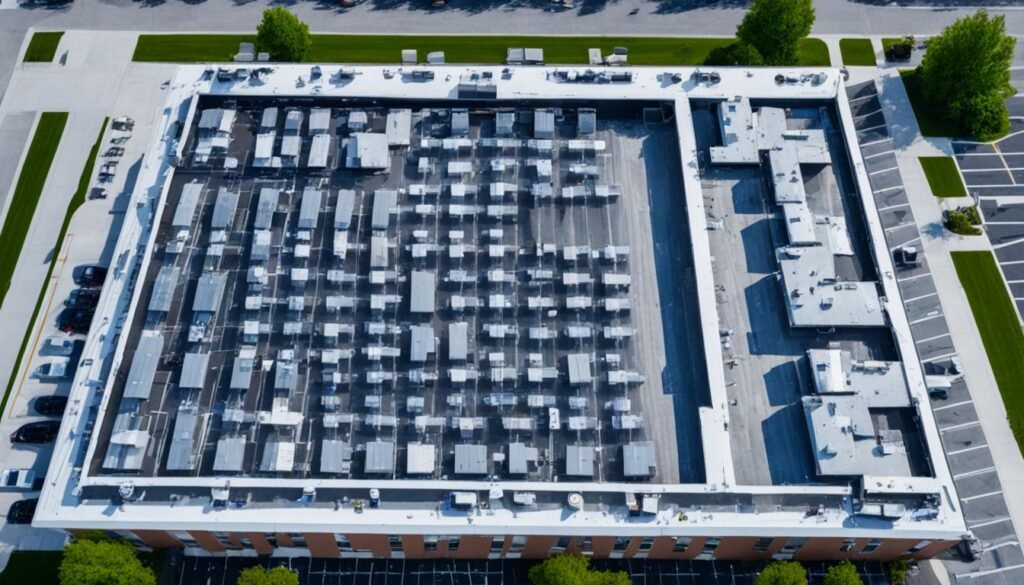According to industry experts, a surprising statistic reveals that only a small percentage of roofs with a “40-year” rating actually reach the full four-decade mark. While the idea of a roof lasting for 40 years is enticing, it’s crucial to understand the factors that affect its longevity. Commercial roofing, with its unique requirements and design considerations, requires careful planning and maintenance to maximize its lifespan. In this article, we’ll explore the truth behind the durability of 40-year roofs and provide valuable insights for business owners seeking long-lasting commercial roof systems.
- The lifespan of a roof depends on various factors such as roofing material, weather conditions, and maintenance.
- The term “40-year roof” is based on ideal conditions, and the actual lifespan can be significantly affected by environmental factors.
- Different commercial roofing materials have varying levels of durability and longevity.
- Consulting with a professional roofing contractor is essential to determine the most suitable roofing system for commercial properties.
- Factors such as regular maintenance, climate, and weather conditions play a significant role in the longevity of commercial roofs.
Understanding the Lifespan of Commercial Roofing Materials
Different commercial roofing materials have varying lifespans. When considering commercial roof construction or replacement, it’s important to understand the longevity of each material and how it aligns with your needs. Here’s a breakdown of the lifespan for some common commercial roof materials:
- Asphalt Shingles: Typically rated to last between 15 to 30 years, depending on ideal conditions and proper maintenance.
- Wood Shingles: Can last up to 30 years with regular upkeep.
- Metal Roofs: Known for their durability, metal roofs can last up to 70 years or longer.
- Clay Tile Roofs: Have a lifespan of 50 years or more.
- Slate Tile Roofs: Can last for a century or longer.
It’s important to note that these lifespans are approximations and can be influenced by various factors such as maintenance, climate, and environmental conditions. Consulting with a professional roofing contractor, like Local Roofer Pros, is crucial in determining the most suitable commercial roof material for long-term durability and performance. They can provide valuable insights and recommendations based on their expertise and knowledge of local conditions.

Ensuring the longevity of your commercial roof requires careful consideration of the materials used and the conditions it will face. By partnering with a trusted roofing contractor, you can make informed decisions about commercial roof construction, replacement, and maintenance that will protect your investment for years to come.
Factors Affecting the Longevity of Commercial Roofs
The lifespan of a commercial roof can be influenced by a variety of factors. One of the most important is regular maintenance. Conducting routine inspections and promptly addressing any issues that arise is crucial in ensuring the longevity of your commercial roof. Neglecting maintenance can lead to premature roof deterioration, which may necessitate early replacement.
Climate and weather conditions also play a significant role in the lifespan of commercial roofs. Extreme heat, frigid temperatures, heavy rain, snowfall, and strong winds can all have adverse effects on the integrity of your roof. Different types of commercial roofing materials may be more or less susceptible to these conditions, requiring additional precautions or maintenance measures.
That’s why it’s essential to work with a professional roofing contractor experienced in both commercial roof maintenance and replacement. A trusted local roofer, such as Local Roofer Pros, has the expertise and knowledge to provide appropriate care for your commercial roof, helping to prolong its lifespan. By partnering with a reputable and reliable roofing company like Local Roofer Pros, you can have peace of mind, knowing that your commercial roof is in good hands.
FAQ
Do 40-year roofs really last four decades?
The term “40-year roof” indicates an estimated lifespan of four decades based on ideal conditions. However, factors such as weather conditions and maintenance can affect the actual lifespan of a roof.
How long do different types of commercial roofing materials last?
The lifespan of commercial roofing materials varies. For example, asphalt shingles typically last between 15 to 30 years, while wood shingles can last up to 30 years with regular maintenance. Metal roofs can last over 70 years, clay tile roofs have a lifespan of 50 years or more, and slate tile roofs can last for a century or longer.
What factors can affect the longevity of a commercial roof?
Various factors can impact the lifespan of a commercial roof, including climate, weather conditions, regular maintenance, and the specific material used. Neglecting maintenance and exposure to extreme elements can lead to premature deterioration and the need for early roof replacement.
